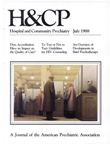Variation in the Self-Concept of Young Adult Chronic Patients: Chronicity Reconsidered
Abstract
A group of 65 young adult chronic patients were asked to assess themselves and to describe a typical community resident and a typical mental patient; they used a semantic differential instrument consisting of adjective pairs arranged in a 7-point bipolar rating scale. The self-assessments of 96 percent of the patients corresponded to their descriptions of either the community resident or the mental patient. Compared with the two-thirds of the sample who described themselves as community residents, subjects who described themselves as patients were more likely to be older and single, to report psychological distress, and to rely on homogeneous support networks. They were also more likely to be taking medications and to be pessimistic about their prognoses, but less likely to have been hospitalized. Such perceptual patterns may lock some young adult patients into patienthood.
Access content
To read the fulltext, please use one of the options below to sign in or purchase access.- Personal login
- Institutional Login
- Sign in via OpenAthens
- Register for access
-
Please login/register if you wish to pair your device and check access availability.
Not a subscriber?
PsychiatryOnline subscription options offer access to the DSM-5 library, books, journals, CME, and patient resources. This all-in-one virtual library provides psychiatrists and mental health professionals with key resources for diagnosis, treatment, research, and professional development.
Need more help? PsychiatryOnline Customer Service may be reached by emailing [email protected] or by calling 800-368-5777 (in the U.S.) or 703-907-7322 (outside the U.S.).



